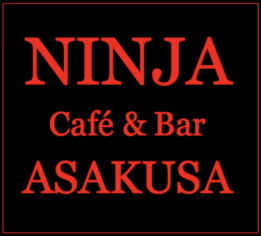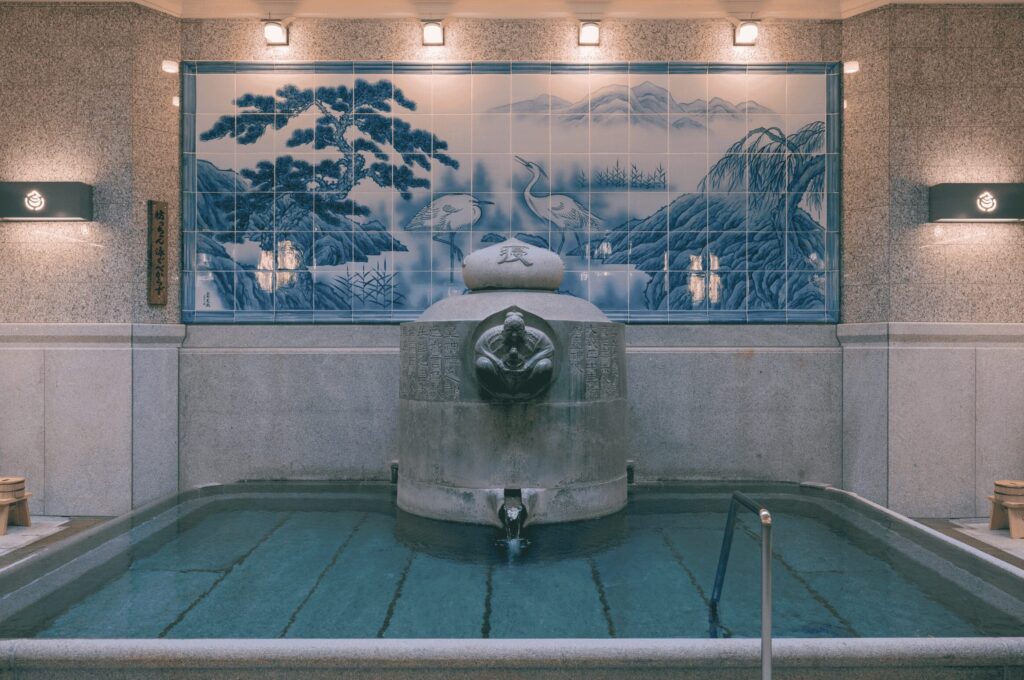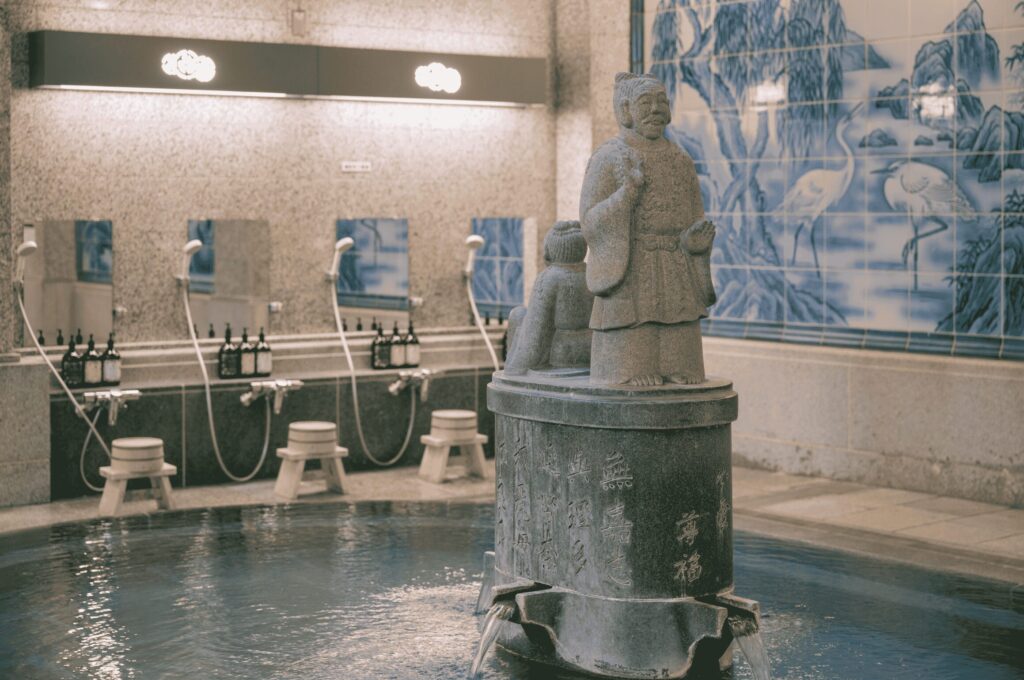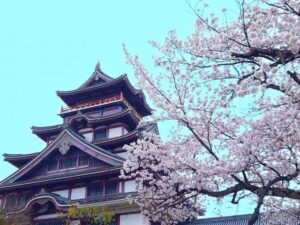Dogo Onsen: Oldest Hot Spring Onsen in Japan
Dogo Onsen, located in Matsuyama City, Ehime Prefecture, and is Japan's oldest hot spring resort, with a history spanning some 3,000 years.
This ancient hot spring resort has long been a popular destination for tourists from Japan and abroad.
Particularly for Westerners, the traditional Japanese hot spring culture, historical background, and pleasant hot-spring healing experience may be appealing.
This article provides an in-depth look at the history of Dogo Onsen, recommended ryokan, souvenirs, sightseeing in the area, and accessibility.
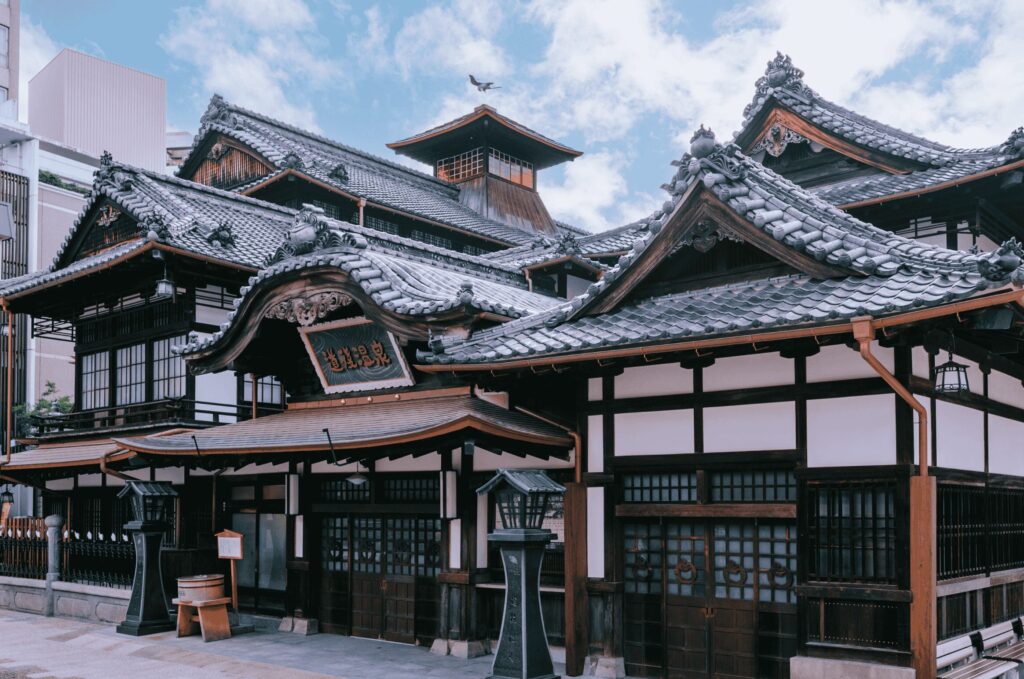
- History of Dogo Onsen: a place where myth and reality intersect
- Dogo Onsen Honkan: a symbol of history and culture
- Recommended Ryokan: for a comfortable stay and onsen experience
- What not to do when in onsen: for a pleasant stay and onsen experience
- Souvenirs from Dogo Onsen: Unique Japanese Specialties
- Nearby Tourist Attractions: let's enjoy history and nature
- How to Access Dogo Onsen
- Summary
1. History of Dogo Onsen: a place where myth and reality intersect
The history of Dogo Hot Springs dates back to the mythical age.
The name Dogo Hot Springs appeared in Japan's oldest history book, Nihon Shoki (The Chronicles of Japan), and in the poetry collection Man-yoshu (Collection of Ten Thousand Leaves).
There is also a legend of a white heron in the area.
This legend tells of an injured egret that was healed the hot springs, an episode widely known as symbolistic of the mystical power of hot springs.
Dogo Onsen has also been loved by royalty and aristocrats since ancient times, and was even visited by Emperor Meiji during the Meiji period.
It is said that Dogo Onsen was used as a reference for the bathhouses in Hayao Miyazaki's movie “Spirited Away".
This historical background elevates Dogo Onsen to a special place that is more than just a tourist attraction.
For Western tourists in particular, the onsen itself is a unique symbol of healing in Japanese culture, and being able to soak in the hot spring water while experiencing its long history is a major attraction.
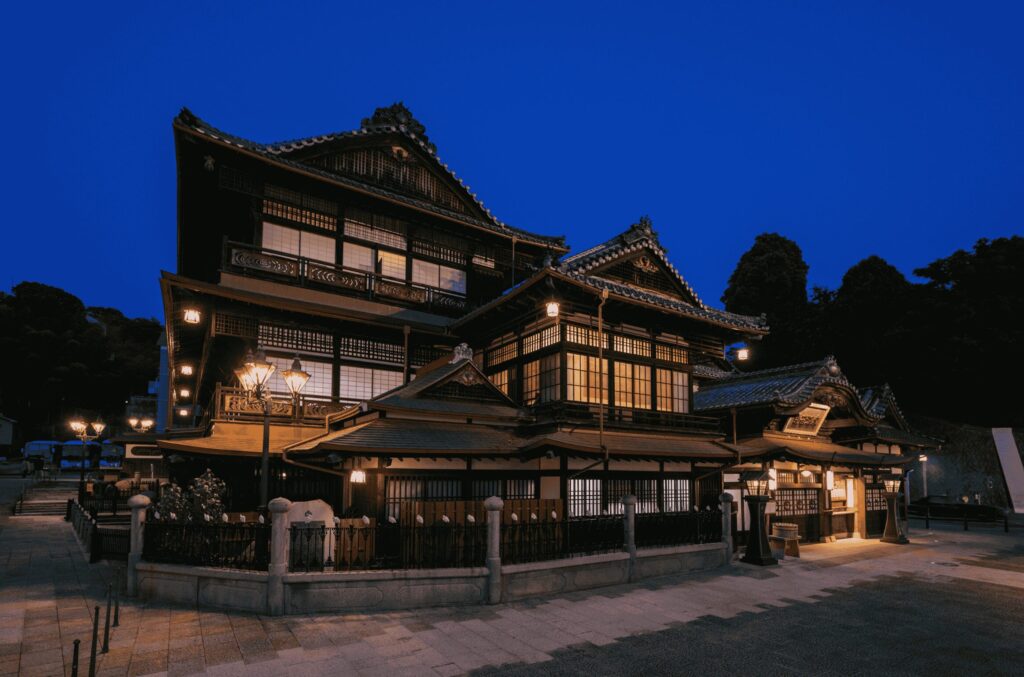
道後温泉PR素材
2. Dogo Onsen Honkan: a symbol of history and culture
The Dogo Onsen Honkan is an essential part of a visit to Dogo Onsen.
This building was built in 1894 and is designated as a National Important Cultural Property.
Its palatial exterior instantly captivates visitors, while the interior reveals the beauty of traditional Japanese architecture.
The Dogo Onsen Honkan has two bathhouses, “Kami-no-yu” and “Rei-no-yu".
In particular, “Rei-no-yu” was once used as a bathhouse exclusively for the imperial family, and visitors can bathe in this bathhouse with a special sense of history.
Unlike Western spa culture, Dogo Onsen has a unique style in which visitors wash their bodies thoroughly before bathing, and then soak in the bathtub to refresh their bodies and minds.
This is a uniquely Japanese cultural experience that is of interest to many foreign tourists.
Visitors can also experience the uniquely Japanese custom of wearing a yukata (light cotton kimono) and enjoying tea in a tatami lounge after onsen.
For Western travelers, experiencing these unique local customs is a great way to gain a deeper understanding of Japanese culture.
3. Recommended Ryokan: for a comfortable stay and onsen experience
Dogo Onsen offers a wide range of lodging facilities, and we recommend 3 of the best ryokan in the hot spring resort area.
Dogo Miyu
With its modern yet traditional Japanese design, Dogo Miyu offers a quiet place to stay surrounded by nature.
Guest rooms offer a relaxing view of the natural scenery of Matsuyama City.
Despite being an onsen ryokan, it is equipped with modern facilities that are comfortable for Western travelers.
Dogo Miyu Official Website
Funaya Ryokan
Funaya Ryokan, established over 390 years ago, is one of the most prestigious onsen ryokan in Japan.
The inn has a beautiful Japanese garden where you can enjoy the scenery of the four seasons.
It will provide you with a luxurious onsen experience while you enjoy your stay in a Japanese-style room.
Funaya Ryokan Official Website
Accommodations near Dogo Onsen Honkan
Although the Dogo Onsen Honkan itself does not offer accommodations, there are many charming ryokans and hotels in the surrounding area.
At these accommodations in the hot spring resort area, you can enjoy the Japanese hospitality while enjoying the hot water of Dogo Onsen.
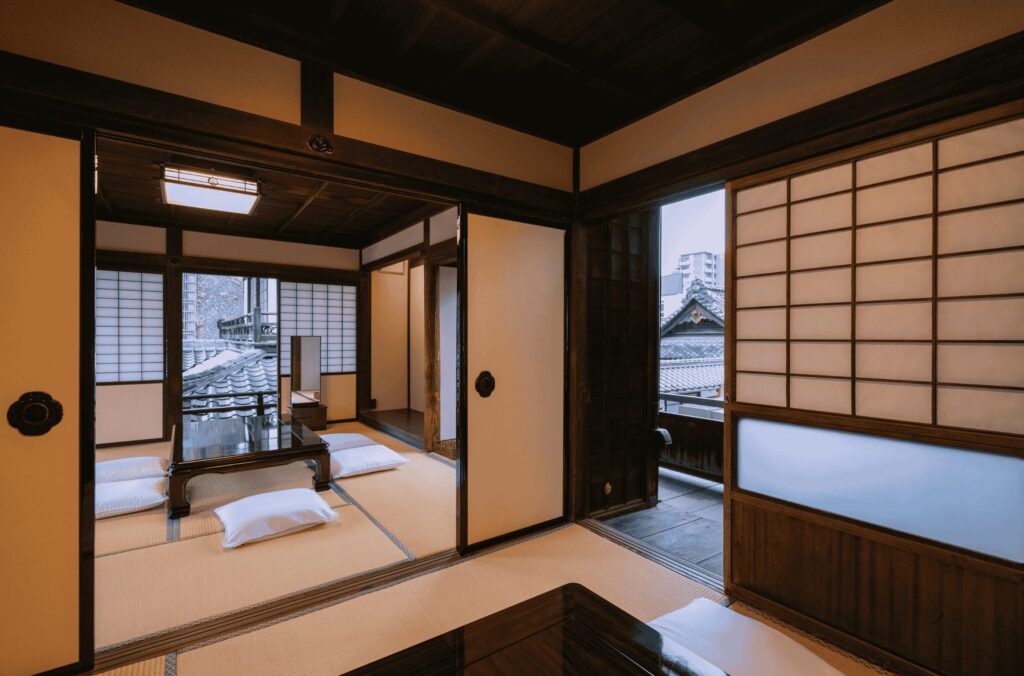
道後温泉PR素材
4. What not to do when in onsen: for a pleasant stay and onsen experience
Manners and precautions at Dogo Onsen are important for foreign visitors who are experiencing Japanese onsen culture for the first time.
It is important to know what not to do in order to have a pleasant and comfortable onsen experience.
Here are some Japanese etiquettes to follow in Dogo Onsen, and in Japanese onsen in general.
Getting into the bathtub without washing your body
In an onsen, you are required to wash your body in the shower or washing area to remove sweat and dirt before entering the bath.
This is to share a clean environment with other people.
Placing towels in the bathtub
Soaking towels in the bathtub should be avoided for hygienic reasons.
In many onsen, towels are usually placed on the head or outside the bathtub.
Speaking loudly
Onsen are places to enjoy relaxation and tranquility.
Especially in historical hot spring resorts such as Dogo Onsen, it is important to be quiet so as not to disturb other bathers.
Avoid talking loudly or getting too excited among friends.
Bathing in onsen after consuming alcohol
Bathing after consuming alcohol is dangerous, especially in hot springs where the water is hot.
Blood circulation may become too high, causing dizziness and even fainting.
It is better to avoid drinking alcohol before entering a hot spring and to enjoy it only after onsen.
Taking pictures and using smartphones
Many onsen facilities prohibit the taking of photographs and the use of phones in the bathhouse to protect the privacy of other people.
Taking pictures in public places and in the presence of other bathers is a breach of etiquette, so please enjoy taking pictures outside of onsen resorts and ryokan.
By observing these basic onsen etiquette rules, you can make your stay in Dogo Onsen more comfortable and enjoyable.
Please respect the Japanese onsen culture and enjoy a relaxing moment.
5. Souvenirs from Dogo Onsen: Unique Japanese Specialties
Dogo Haikara Dori Street (Dogo Shopping Street) is lined with numerous souvenir stores for tourists to enjoy.
For visitors from abroad, uniquely Japanese souvenirs will be very memorable.
Here are a few souvenirs that we particularly recommend.
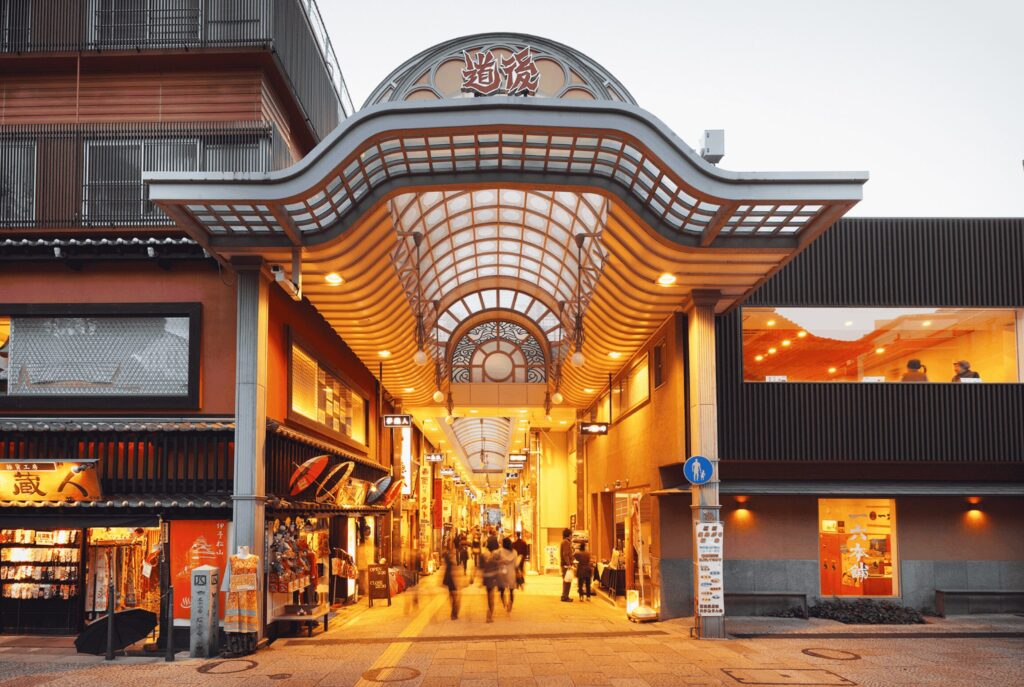
道後温泉PR素材
Mikan (mandarin oranges)
Ehime Prefecture is famous as Japan's largest producer of mikan (mandarin oranges).
In the hot spring resort areas, many related products are sold, such as mikan juice, mikan jam, and sweets made from mikans.
In particular, mikan juice that comes out of the faucet is very popular among tourists.
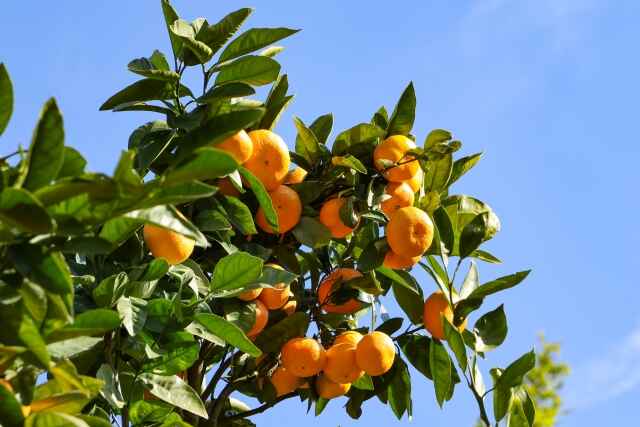
Imabari towel
Imabari City, located next to Matsuyama City in Ehime Prefecture, is world famous for its high-quality towels.
Imabari towels can be purchased at Dogo Onsen as well, and their softness and high absorbency are top notch.
They are ideal towels to use at the onsen and can make great souvenirs for anyone.
Imabari Towel Official Online Store
Dogo beer
Dogo Beer, a locally brewed craft beer, has a refreshing taste that is perfect after a hot spring bath.
"Dogo Yu-agari Beer” is especially refreshing and recommended for beer lovers.
6. Nearby Tourist Attractions: let's enjoy history and nature
When you visit Dogo Onsen, be sure to enjoy the surrounding places.
Matsuyama is a beautiful city where history and nature are in harmony, and there are many things to see and do.
Matsuyama Castle
Located in the center of Matsuyama City, Matsuyama Castle is a beautiful castle built in the Edo period (1603-1867) and offers a wonderful view from its observation deck overlooking the Matsuyama Plain.
Visitors can take a lift or cable car up to the top of the mountain, making it a must-see spot for history lovers.
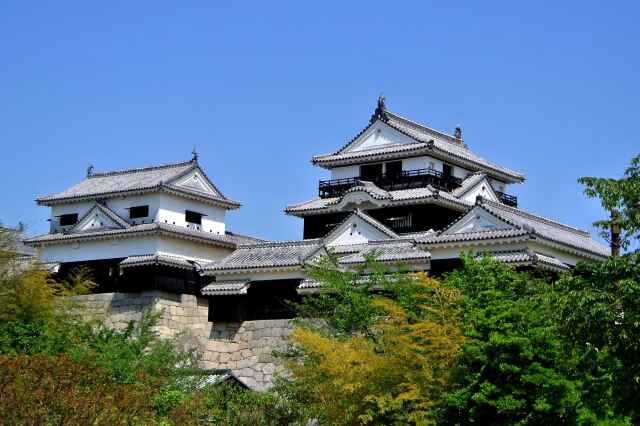
Shikido Memorial Museum
Shikido Memorial Museum, with its exhibits on the haiku master, Masaoka Shiki, is a must-see for tourists interested in literature.
Masaoka Shiki established modern haiku in Japan, and through his works and life, visitors can learn about Japan's literary background in depth.
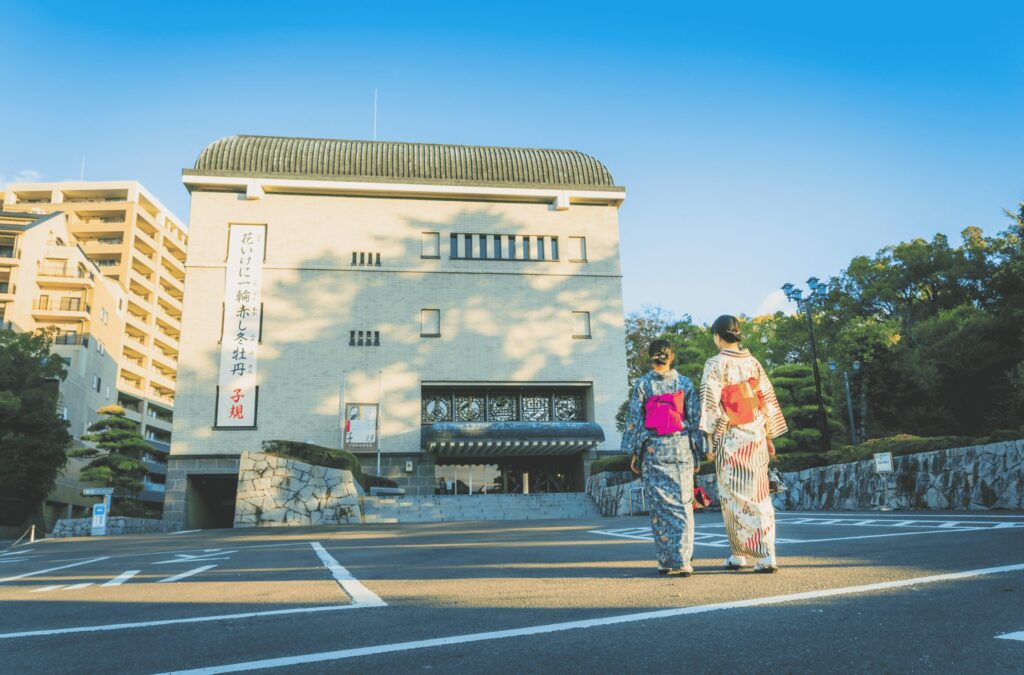
道後温泉PR素材
Ishiteji Temple
Ishiteji Temple, a 15-minute drive from Dogo Onsen, is one of the 88 sacred sites on Shikoku Island, and its Buddhist architecture and beautiful gardens are a must-see.
Here, visitors can experience Japanese Buddhist culture and spend some quiet time.
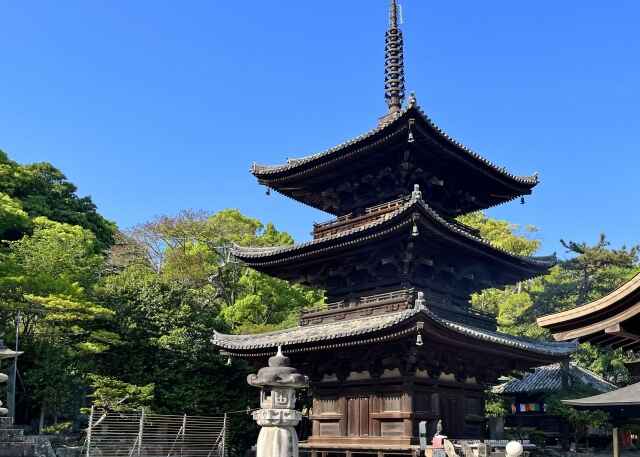
7. How to Access Dogo Onsen
Access to Dogo Onsen is very convenient from both inside and outside Japan.
Matsuyama City is the gateway to Shikoku and can be easily visited by air or by land.
Airplane
The nearest airport is Matsuyama Airport.
There are direct flights from major cities in Japan such as Tokyo, Osaka, and Fukuoka, and it takes about 40 minutes from the airport to Dogo Onsen by limousine bus.
Train
Streetcars run from JR Matsuyama Station to Dogo Onsen Station, which takes about 20 minutes.
The retro trams are popular with tourists as a means of transportation that also allows them to enjoy sightseeing in Matsuyama City.
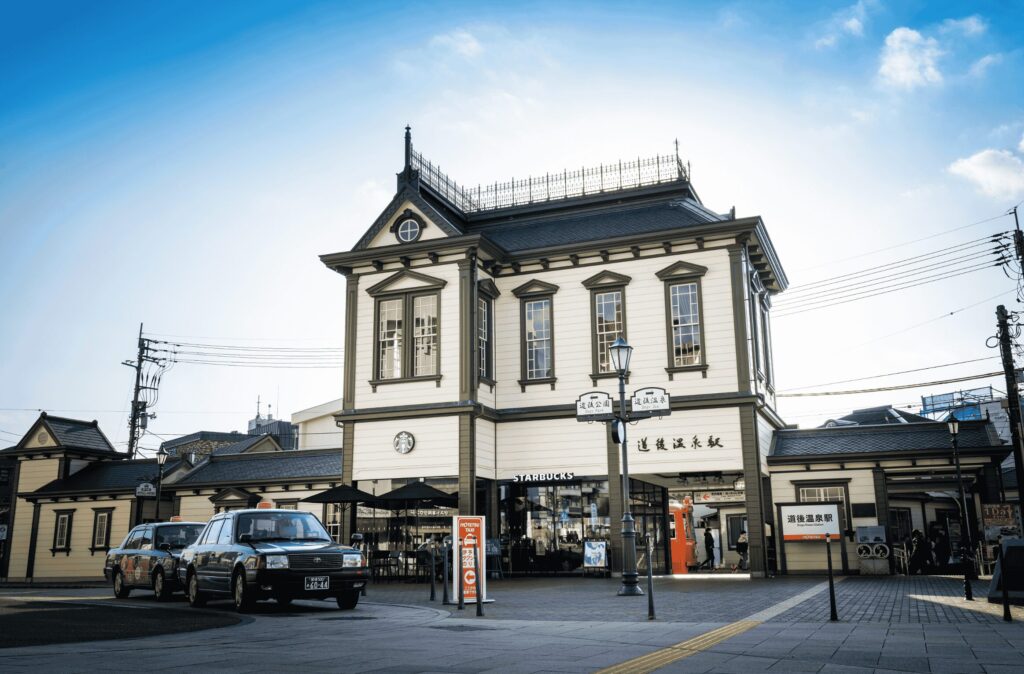
道後温泉PR素材
Car
Access by car is easy from all parts of Shikoku.
The Shikoku trans-expressway provides smooth access from Takamatsu and Tokushima.
In addition, parking lots are available in the hot spring resort area, making it suitable for sightseeing by rental car.
8. Summary
Dogo Onsen is a place where visitors can experience the history, culture, and healing power of hot springs, all of which are fascinating aspects of Japan.
Walking through the hot spring resort area, visitors can feel the unique atmosphere where the past and present intersect, creating an unforgettable travel experience.
From hot springs to lodging, dining, and sightseeing in the area, Dogo Onsen is truly a place where the charms of Japan are concentrated.
What are we?
We run Ninja Experience Cafe in Tokyo, Kyoto and Osaka, Japan.
Here you can immerse yourself in Japanese culture through experiencing ninja training.
Both adults and children are welcome to try their hand at defeating the ninja master inside the cafe.
The cafe is an indoor interactive zone, so it can be enjoyed even on rainy days.
If you are thinking "I want to be a real ninja too!” or interested in becoming a real ninja, please visit us.
Reservations can be made here.
Unauthorized copying and replication of the contents of this site, text and images are strictly prohibited.
